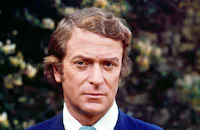Tonight Let's All Make Love in London
Brief Synopsis
Cast & Crew
Peter Whitehead
Michael Caine
Edna O'brien
Genevieve
Vanessa Redgrave
Eric Burdon And The Animals
Film Details
Technical Specs

Synopsis
This impressionistic view of 1967 London is devised as a "Pop Concerto for Film." The "overture," a montage of images set to rock music, is followed by seven "movements." The first, "Loss of the British Empire," includes scenes of traditional London: the changing of the Royal Guard, conservative clothing, a band playing. During the second movement, "Dollygirls," novelist Edna O'Brien discusses the morality of modern women, and pop singer Genevieve is interviewed. "Protest" features actress Vanessa Redgrave singing at a political demonstration in Royal Albert Hall and rock group Eric Burdon and the Animals performing. In "It's All Pop Music," record producer Andrew Loog Oldham guides two new talents, Twice As Much and Vashti, through recording sessions, while his most successful group, the Rolling Stones, perform in concert. The Stones's lead singer Mick Jagger is interviewed on the subject of modern youth. "Moviestars" features actress Julie Christie discussing her private life and the contemporary London scene and actor Michael Caine commenting on recent changes in British society. "Painting Pop" features interviews with painter and designer Alan Aldridge and painter David Hockney. In "As Scene from U.S.A.," actor Lee Marvin, London Playboy Club manager Vic Lowndes, and American model Donyale Luna are interviewed. A "postlude" features the music of experimental rock group Pink Floyd with the voice of poet Allen Ginsberg commenting optimistically on pop culture.

Director
Peter Whitehead
Cast

Michael Caine
Edna O'brien
Genevieve

Vanessa Redgrave
Eric Burdon And The Animals
The Twice As Much
Vashti
Andrew Loog Oldham
The Rolling Stones
Mick Jagger

Julie Christie
Alan Aldridge
David Hockney
Vic Lowndes

Lee Marvin
Donyale Luna
Pink Floyd
Allen Ginsberg
The Small Faces
Chris Farlowe
Marquis Of Kensington
Crew

Film Details
Technical Specs

Quotes
Trivia
Notes
Released in Great Britain in 1968. First shown commercially in the U. S. with a collection of short films titled The Kinetic Art: Series One, Program 2, q.v.












